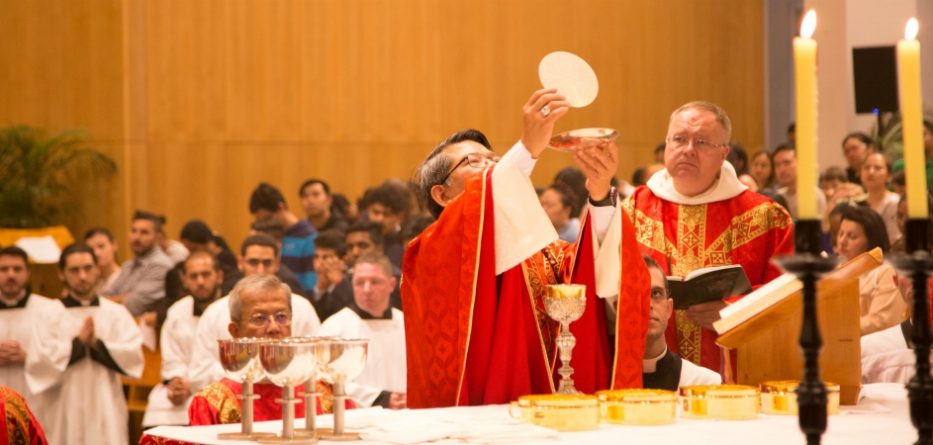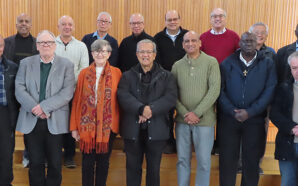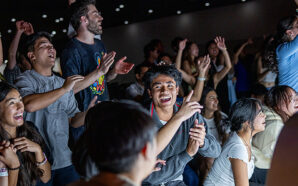Homily for Corpus Christi Year A 2020
Readings: Deut 8:2-3, 14-16; 1 Cor 10:16-17; John 6:51-58
14 June 2020
Today is the Feast of Corpus Christi – the Most Holy Body and Blood of Christ, the bread of life, and the cup of salvation. Pope Francis is fond of telling us, and causing upset to some more traditional, legalistic Catholics when he does: ‘the Eucharist is not a prize for the perfect, but a powerful medicine and nourishment for the weak’.
Most of us remember our first communion. I was 6 ½ years old. I think it was the first time I wore a tie, with the starched white shirt and the first communion medal pinned on. We had to practise receiving the host on the tongue, ensuring that the host did not touch the sides of the mouth, being swallowed directly. Mother Matthew lined up the Grade 2 class at one practice placing the cross from her rosary beads on the tongueof each class member, teaching us to open our mouths appropriately. There were no hygiene concerns back in those days.
LISTEN: https://soundcloud.com/frank-brennan-6/homily-for-corpus-christi
For the next four years of primary school, my school participated in the annual Corpus Christi procession at the Brisbane Exhibition Grounds. We Catholics came together proudly and joyfully to profess our faith. Thousands of students in uniform processed behind the real Eucharist which was distinguished from anything professed by non-Catholics. In primary school, we were not much given to fine theological distinctions, but we knew that we believed in the real presence.
Being the eldest of seven children, I had the delight of sharing the family joy and parish celebration each time one of my younger siblings in turn made their first communion. As a priest, I have had the great privilege of giving first communion to a number of my nieces and nephews, and now grand nephews and grand nieces. These are not just fine family celebrations. They are celebrations of the whole eucharistic community gathered at the table of the Lord.
Each time we come to Eucharist, we come like the chosen people in the first reading from Deuteronomy today. Moses tells the people to remember: Remember how the Lord led you for 40 years in the wilderness. He made you feel hunger. He fed you with manna in the desert. Do not forget the Lord brought you out of slavery, guiding you through a vast and dreadful wilderness.
On this feast of Corpus Christi, we remember. How could we possibly forget. We remember the summer bushfires. We remember the pandemic. We remember that Black Lives Matter. We remember the protests and the riots. We remember the shortcomings of our Church in the wake of the royal commission. We are hungry. We are thirsty. We are worried. We are alone. We need food for the journey. We need each other’s company and the company of the Lord.
Reflecting on today’s readings on this feast three years ago, Pope Francis suggested that the Eucharist, the sacrament of unity, provides us with a grateful, free and patient memory, reminding us that we are not isolated individuals, but one body, the body of Christ. He said: ‘The Eucharist gives us a grateful memory, because it makes us see that we are the Father’s children, whom he loves and nourishes. It gives us a free memory, because Jesus’ love and forgiveness heal the wounds of the past, soothe our remembrance of wrongs experienced and inflicted. It gives us a patient memory, because amid all our troubles we know that the Spirit of Jesus remains in us. The Eucharist encourages us: even on the roughest road, we are not alone; the Lord does not forget us and whenever we turn to him, he restores us with his love.’ (http://www.vatican.va/content/francesco/en/homilies/2017/documents/papa-francesco_20170618_omelia-corpus-domini.html)
For the last few months, the eucharistic community has been enduring a wilderness experience being unable to gather together in the flesh to break bread, remember, and receive. At their recent conference, our Australian bishops sent us a note of encouragement reassuring us: ‘The celebration of Mass has never ceased. Though we and our brother priests cannot yet offer Mass with the people, we are still offering Mass day by day for the people – for all of you who are “flesh of our flesh and bone of our bone” (cf Genesis 2:23)’. But as we know, it’s just not the same.
I was inspired by Penelope Middelboe from Oxford who wrote to the London Tablet after attending her first live-streamed mass. She recalled that she had written to her priest saying: ‘I was wondering whether you might ask your virtual congregation to put their own bread and wine out on the table in front of their computer screens so that you might include them in your Eucharist. I cannot imagine that the power of the sacrament would be restricted in any way. We will lay out our bread and wine in anticipation.’ I know a number of people who have told me that they have laid out their bread and wine beside their computer during a live streamed mass, sharing as best they can in the celebration of the eucharist, and looking forward to the day when they can return to the eucharistic table with their fellow parishioners and a priest presiding in their presence.
A few weeks after Ms Middleboe wrote, another writer from Oxfordshire, Dr Paul Sheppy wrote: ‘We are told (rightly) that we do not need to be in a church building to pray. We are told (rightly) that we can use various digital platforms to pray and worship together. We are told also that participation in Communion at the Mass requires our physical presence. We cannot take bread and wine in our homes and hold them out as the digitally mediated priest consecrates the elements and think that thereby we are participating in the Communion of holy things for holy people. We are being denied access to the Sacrament that we are taught nourishes us to eternal life. We are in the same storm but not, it appears, in the same boat.’
Even once the pandemic ends, we know that there are many challenges to making the eucharist available to the faithful. Preparing for the 2021 Plenary Council, we have all been invited to participate in a process of listening and dialogue. One of the questions being asked is: ‘How is God calling us to be a Christ-centred Church in Australia that is prayerful and Eucharistic?’ One of the Discernment writing groups has asked: ‘How can we best encourage full, conscious and active participation in the liturgical and prayerful life of the community?’ They’ve offered us some pointers, following the lead from Pope Francis’s response to the Amazon Synod. They have suggested:
‘Like those who participated in the 2019 Amazon Synod, the Church in Australia now has an opportunity to discern new expressions of ministry and liturgy that are appropriate to our needs and responsive to the Spirit. The Eucharist is central to the spiritual lives of Catholics. Every effort should be made to ensure that Australians, no matter where they live, ‘do not lack this food of new life and the sacrament of forgiveness’(Querida Amazonia, #89). While ordination continues to remain largely reserved to unmarried men, Pope Francis challenges our Church ‘to be open to the Spirit’s boldness, to trust in, and concretely to permit, the growth of a specific ecclesial culture that is distinctively lay’ (QA #94). As such, we need to be open to new positions and ecclesial services that both men and women, married and unmarried, can undertake which ‘entail stability, public recognition and a commission from the bishop’ (QA #103). For instance, our Sunday Eucharist would be enriched if the voices of lay experience and insight were heard more often, especially those of women. Together we can find ‘other, better ways, perhaps not yet even imagined’, confident that ‘wherever there is a particular need, the Spirit has already poured out the charisms that can meet it’ (QA ##104,94).’ (https://plenarycouncil.catholic.org.au/wp-content/uploads/2020/05/PC2020-thematic-papers-3.pdf)
Aware that the Eucharist is ‘not a prize for the perfect, but a powerful medicine and nourishment for the weak’, we pray: ‘Lord I am not worthy that you should enter under my roof, say but the word and I shall be healed.’ In faith and gratitude, united with all who are the body of Christ, we then receive food for the journey, being missioned to proclaim the good news to the world that the bread we have been given is the Lord’s flesh and is for the life of the world. God knows:in the wake of the bush fires, the pandemic, Black Lives Matter and the political turmoil, ‘we cannot properly receive the Bread of Life without sharing bread for life with those in want.’ (Pedro Arrupe, Address to International Eucharistic Congress, Philadelphia, 1976 https://jesuitportal.bc.edu/research/documents/1976_arrupeeucharist/).
Having received the bread of life, we experience the Lord living in us and us living in Him. Just as He gave his life for us, so too we go forth dedicating our lives to others. None of us lives on bread alone, but on everything that comes from the mouth of the Lord. There is only one loaf; we share it; ‘though there are many of us, we form a single body’.
The Body of Christ.
Amen.
Fr Frank Brennan SJ is the Rector of Newman College, Melbourne and the former CEO of Catholic Social Services Australia (CSSA).








